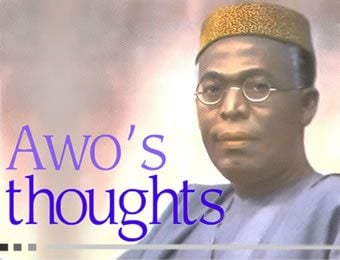FOR a prescribed number of hours a week, outside his or her normal hours of study or work, every Nigerian between the ages of 15 and 25 should receive compulsory military training, and from time to time attend a military refresher course if he or she is between 25 and 40.
- The following principles should govern the collection and allocation of revenue in the Federation:
(i) National Interest.
(ii) Even Progress.
(iii) Deed and Need.
(iv) Derivation.
Nigeria should be a socialist state.
All the provisions of the Constitution, made in pursuance of the 33 foregoing objectives, should be entrenched, and should be altered only by the people voting in a referendum.
Commentary
I am limiting the commentary on the foregoing objectives to the proviso to paragraph 7, and paragraphs 12,31,32; firstly, because all the others have been extensively discussed in Chapters 3 and 5 of Thoughts on Nigerian Constitution and Chapters 10 and 11 of The People’s Republic, and secondly, because in any case these other objectives speak for themselves.
- Autonomous Districts
Under the arrangement of 18 States proposed by me, there is no room at all for any major ethnic group to dominate or to be suspected of dominating any minority ethnic group or groups. This is, however, not the case with all the present 12 States. With the exception of the Western, East Central, Kano, and Lagos States, each of the States is a mixture of majority and minority ethnic groups. Of all the 12 States, therefore, 8 have within them the seeds of their eventual disintegration.
As a matter of practical politics, however, the stubborn fact must be recognized that these 12 States are now in existence and functioning. Until they are radically reorganized, it is our duty to do all in our power to promote, as much as human ingenuity can contrive it, harmonious relationship among the majority and minority national groups living within the borders of each of these 8 heterogeneous States. It is for this reason that I have proposed that where in any State there are minority linguistic groups, each of such groups should be constituted into an autonomous district with its own legislature and executive, and with certain matters, which should be clearly specified in the Constitution, vested in it.’
The way to go about this is to specify in the Constitution (1) certain sensitive and strictly local matters such as chieftaincy, forestry, primary and secondary education, local government, village industry, community development, etc., which an Autonomous District can, as a final authority, exercise, and (2) certain other matters in respect of which the State Government must take the advice of an Autonomous District before taking a final decision.
An arrangement such as this operates smoothly and successfully in the USSR and Yugoslavia, and there is no doubt that, if it is introduced in Nigeria, it would go a long way to assuage, temporarily, existing agitation for separate States, on the part of the national minorities in each of the 8 States.
- Exclusive Federal Functions
Many people would be taken aback by the principle that only matters which cannot be decentralized, without endangering the unity and territorial integrity of Nigeria, should be included in the exclusive legislative list. But it is my considered view that this is what will have to be done, in order to keep the various national groups in Nigeria together in harmonious unity.
The matters which, in my humble opinion, cannot be decentralized without risking the unity and territorial integrity of the country are the following:
(1) Appeals to the Supreme Court of Nigeria.
(2) Arms and ammunition.
(3) Bills of Exchange and Promissory Notes.
(4) Borrowing of monies outside Nigeria.
(5) Census.
(6) Control of capital issues.
(7) Currency, coinage, and legal tender.
(8) Customs and excise duties, including export duties.
(9) Defence.
(10) Designation of Securities in which trust funds may be invested.
(11) Determination and co-ordination of standards in all schools and educational institutions.
(12) Elections to the Federal Parliament, to the Legislatures of the States and Autonomous Districts, and to Local Government Councils.
(13) Exchange Control.
(14) External affairs.
(15) Foreign trade, including the sending of economic or any other government sponsored mission or delegation to a foreign country.
(16) Immigration into Nigeria.
(17) Incorporation, regulation, and winding up of bodies corporate other than co-operative societies, local government authorities, and bodies corporate established directly by any Law enacted by the Legislature of a State or Autonomous District.
(18) Insurance.
(19) Labour.
(20) Legal, medical, and other professions.
(21) Legal proceedings between the Government of the Federation and a State Government, or any other person or authority, or between the Government of a State and an Autonomous District, or between the Governments of States or of Autonomous Districts.
(22) Maritime shipping and navigation.
(23) Mines and minerals, including oil-fields, oil mining, geological surveys, and natural gas.
(24) Naval, Military, and Air Forces.
(25) Newspapers, books, and printing presses.
To be continued






